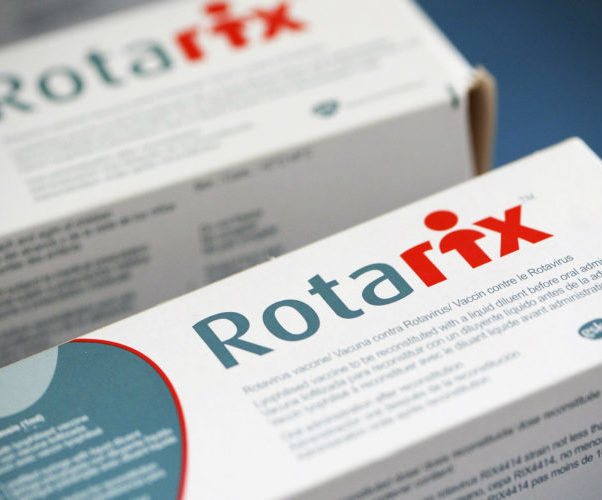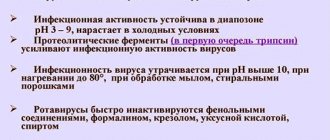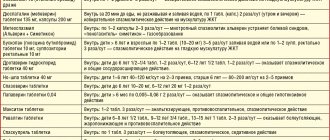Signs and symptoms of rotavirus intestinal infection in adults
The name rotavirus comes from the word “rota” (from English “wheel”). The origin of the name has nothing to do with the word “mouth” .
Rotaviruses are transmitted by the fecal-oral route. You can become infected not only through airborne droplets, but also in many other ways :
- Through contaminated food
- Upon contact of hands
- Through dirty water
Rotaviruses infect the mucous membrane of the gastrointestinal tract.
Rotavirus in adults
Symptoms of rotavirus infection in the first days of illness are expressed as follows:
- Fever
- Frequent vomiting
- Diarrhea
- Rumbling in the stomach
In addition, rotavirus infection is accompanied by pain, sore throat, and mild runny nose.
You can assume infection with rotavirus by observing your stool: on the first day, the stool is liquid yellow in color, the next day it is grayish with a clay-like consistency.
The infection can be diagnosed by testing stool for antibodies to the virus.
Important: Rotavirus infection usually affects children aged 2 to 6 years. The disease in adults often passes under the guise of food poisoning - the symptoms of these two diseases are very similar. However, unlike food poisoning, rotavirus is contagious.
It is worth noting that the immunity of adults is able to resist the disease more steadfastly than children's immunity. Therefore, quite often rotavirus infection in adults occurs in a mild form.
Vaccination scheme
In case of rotavirus infection, vaccination plays an important role. The vaccine does not provide protection against vomiting and diarrhea caused by other harmful organisms, but it is an effective remedy for similar symptoms. According to the vaccination schedule, you first need to consult a doctor and his conclusion that the child is healthy, does not have an elevated body temperature, and does not have vomiting or loose stools.
- The first dose of vaccination is given when the child reaches two or three months;
- the second - no earlier than 30 days;
- the third is done a month after the second, but not later than six months of age.
- The first dose of vaccination is allowed if the child is one and a half months old;
- the second - after four weeks, but not later than seven months of age.
All periods are arbitrary and depend entirely on the general condition of the child and individual tolerance to the drugs. When vaccinating, only one drug should be used. If the need arises, it is allowed to complete the vaccination with another means. Vaccination is carried out only in infants. Vaccination against rotavirus is not practiced for adults. This is explained by the fact that they easily tolerate this disease, often without even feeling symptoms.
Vaccinations do not pose a risk to the life and health of the baby. Reviews from parents who have had their children vaccinated against rotavirus boil down to the fact that tolerability is good, only occasionally an allergic reaction in the form of a rash occurs. Doctors recommend drinking Fenistil drops on the first day, adhering to the dosage indicated in the instructions. Children at this age tolerate vaccination without complications. Even those diagnosed with HIV or prematurity.
However, children’s bodies are different and, accordingly, react differently. Although rare, some complications do occur after administration of the drug. Such as:
- five to seven days after vaccination, the child may have minor abdominal pain and infrequent bouts of vomiting;
- weakness occurs, the child may become lethargic and restless;
- the urge to diarrhea and vomiting will appear;
- decreased appetite;
- the baby will have excessive gas production, which will make him capricious;
- body temperature rises.
Although vaccination will develop immunity to intestinal flu, it is important not to forget about careful adherence to hygiene rules and parental control over what the child drinks and eats.
Despite the fact that vaccination against intestinal infection is harmless and does not cause any problems for the child, there are cases of individual intolerance to the drug. If parents notice that their child has become lethargic, easily excitable, has begun to eat poorly, refuses breast milk, his body temperature has risen, and loose stools have appeared, then there is no need to panic and run to the hospital.
If such adverse reactions to vaccination occur, they are short-term in nature, and within a day they will no longer bother the child. But if parents suspect that adverse reactions are worrying their baby too much, then they need to seek advice. The doctor will examine the child, listen to you, and then take the necessary measures. If there are grounds for this, he will prescribe medications and prescribe the required dosage, which is allowed for the child’s age, so that they can eliminate unpleasant symptoms.
The body can react in a specific way not only to the rotavirus vaccine, but also to any other. Such a reaction is rare. Drugs taken as a vaccination against rotavirus are well tolerated in most cases. However, no one has canceled adverse reactions, and they can be both mild and severe.
Mild reactions include nervous irritability, pain in the abdominal area, a slight increase in body temperature, and sometimes short-term cases of vomiting and diarrhea.
Severe complications include intussusception. This means that an obstruction has formed in the intestines. This dangerous phenomenon can only be treated in a hospital under the constant supervision of a doctor. Surgery cannot be ruled out.
Vaccination against rotavirus infection is not mandatory in our country. But it has advantages:
- Vaccination is an effective method to avoid infection;
- The drugs used as vaccinations are not dangerous and in most cases do not cause side effects in those who are vaccinated;
- It is difficult to avoid infection, because sources of infection are everywhere: on the street, in contact with animals (even pets), in public transport and any crowded place, in an educational institution, in a supermarket;
- Develops stable immunity to infection, which reduces the number of people infected by 90 percent;
- Due to the fact that vaccination takes place through the oral cavity, there are no problems with vaccinating children born prematurely or suffering from HIV.
Only parents decide whether the child needs it or not. It is necessary to decide this in advance, when the baby is just born or while still in the womb. Because vaccination is recommended before the age of six months. It will protect the child from infection for five years. Vaccination against rotavirus after 8 months is pointless.
Parents may think that rotavirus is not a dangerous disease, so vaccination is not useful. But not all parents know that rotavirus is expressed in profuse vomiting and diarrhea. If such symptoms are easily tolerated by adults, then dehydration occurs several times faster in infants. And severe dehydration in infants leads to resuscitation or death.
Only parents need to weigh the pros and cons, and then decide whether to vaccinate their children or not.
Vaccination against rotavirus has recently been introduced into the compulsory vaccination schedule. Previously, the vaccine was used at the discretion of parents.
How long is the incubation period for rotavirus infection in adults?
If one family member becomes ill, there is a high probability that other family members will soon become infected with rotavirus infection. The disease is divided into three stages:
- Incubation period (3-5 days)
- Acute stage (about 5 days, sometimes 7 days)
- Recovery stage (4-5 days)
Symptoms of rotavirus infection
How many days is rotavirus infection contagious for adults after contact with a sick person?
Important: You can become infected with rotavirus even before a person develops acute symptoms of the disease. In general, a rotavirus carrier poses a threat to others for 10 days.
The period of the acute stage is especially dangerous, when the patient has vomiting and loose stools.
It is advisable to isolate infants and pregnant women from the sick. If you do have to come into contact with a sick person, follow the rules:
- A patient with rotavirus should use individual utensils
- Wash your hands often with soap, and the patient should also wash their hands and face frequently
Side effects and consequences of vaccination
Almost 100% of babies tolerate vaccination easily; in rare cases, allergies or mild diarrhea occur. Diarrhea lasts up to 7 days and may be accompanied by vomiting, bad mood and irritability.
In one case per 100 thousand vaccinated people, severe complications affecting the intestines develop. However, after surgery, children recover quickly.
Side effects include:
- The composition includes latex, if the baby is allergic to it, then consequences are possible. It is not so easy to identify the allergen to this material before vaccination;
- the child may be capricious and not sleep for several days after vaccination;
- in rare cases, a fever develops; it usually comes with vomiting or diarrhea; the symptom does not occur on its own.
The vaccine also has some contraindications. So, you cannot give a second dosage if the baby had a pronounced reaction to the first one.
Important! It is not recommended to get vaccinated for any chronic gastrointestinal diseases in order to avoid disturbances in the intestines and surgical intervention.
During acute inflammatory processes, any vaccination is postponed indefinitely.
Tablets, drugs for the treatment of rotavirus infection in adults at home
There is no specific treatment regimen for rotavirus. There is no point in taking antiviral drugs and antibiotics. However, rehydration therapy and the use of sorbents (smecta, activated carbon, enterosgel) are necessary.
Rehydration therapy involves drinking plenty of fluids to prevent dehydration during diarrhea. Saline solutions, unsweetened compotes, herbal teas - this drink is suitable for the treatment of rotavirus disease.
Treatment of rotavirus
How to treat rotavirus infection in adults with folk remedies?
Having simple components on hand, you can prepare solutions for the treatment of rotavirus infection.
- To prepare a saline solution, mix 1 tsp. salt, 5 tsp. sugar per 1 liter of boiled water. Take the solution throughout the day.
- You can also make a soda solution . Take the same amount of water, salt and sugar as in the previous recipe and add 1 tbsp. baking soda.
- Decoctions of chamomile, St. John's wort, and calamus will relieve inflammation of the intestinal walls and help restore water balance. Herbal mixtures can be bought at the pharmacy, they are quite inexpensive.
- , infusion of pomegranate peel helps well . Just pour a glass of boiling water over the peel, leave for half an hour and drink little by little.
Traditional methods of treating rotavirus
Nutrition for adults with rotavirus infection
When sick with rotavirus infection, it is important to adhere to a strict diet .
First of all, you need to exclude:
- Dairy products, milk porridges
- Fatty, spicy, salty
- Sweets
- Carbonated drinks
- Raw vegetables or fruits
You are allowed to eat the following foods:
- Vegetable soups
- Rice and semolina porridge on water
- Rusks or stale black bread
- Compotes
- Herbal teas
- Boiled (or steamed) fish and lean meat
- Light broth
- During the recovery stage, mashed potatoes can be administered.
It is difficult to follow a diet; you will have to give up many familiar foods, however, diet is the only way to a speedy recovery.
Vaccination for adults against rotavirus infections
The vaccine is a reliable method of preventing rotavirus infection. You should know that:
- The rotavirus vaccine consists of live, weakened strains of viruses (administered orally)
- The vaccine can be given to both adults and children
- The vaccination should be done in 2 doses, then it will protect the body from rotavirus attacks
- It was found that the vaccine does not lose effectiveness if given simultaneously with other vaccines (for example, DTP)
- Vaccination against rotavirus will protect the body for several years; there is no lifelong immunity.
Important: The vaccine should not be given to those who had a severe allergic reaction during the first dose, as well as to people with immunodeficiency syndrome. Vaccination of people with intestinal defects and chronic gastrointestinal diseases is questionable (the final decision is made together with the doctor). It is also contraindicated to get vaccinated during the acute stage of the disease.
Vaccine for rotavirus infection
Advantages of vaccination
Vaccinations create active or passive specific immunity. This means that the introduction of a particular drug into the body leads to the production of its own antibodies to a specific pathogen. The persistence and duration of active immunity ranges from several years to the end of life. The formation of such protection is similar to the infectious process on a reduced scale. Antibodies are produced and circulate in the blood, and there are no clinical manifestations. This happens because the vaccine preparation retains the immunogenic properties of the microorganism, but the pathogenic qualities are destroyed or weakened to a minimum.
Vaccines prepared on the basis of attenuation - weakening of live viruses - are the most effective means for active immunization.
These include the vaccine against rotavirus infection. Thanks to a detailed study of the antigenic structure of rotavirus, it became possible to create a drug that is weakened in terms of infection, but suitable for forming a full-fledged immune response.
It is known that in young children, in the first years of life, rotavirus infection is severe, the percentage of deaths is quite high, therefore it is recommended to vaccinate before the child reaches the age of 6 months. Such a simple measure reduces the risk of becoming infected with a severe form of the virus by 90%, and allows you to avoid mild to moderate illness in almost 80% of cases. In addition, active vaccination, especially for children under 6 months of age, has significantly reduced the prevalence of rotavirus infection.
What are the complications of rotavirus infection in adults?
Rotavirus is usually tolerated without side effects or complications. If the patient drinks and eats correctly within 10 days, he recovers without consequences.
The most dangerous factor in the development of infection is dehydration. In some cases, dehydration can be fatal.
It is also necessary to monitor body temperature. It is not worth reducing the temperature to 38º if the patient tolerates it normally. It is at this temperature that the body destroys harmful viruses. However, if the temperature goes beyond 39°, it is necessary to take an antipyretic, since such a temperature puts a strain on the cardiovascular system.
The effectiveness of rotavirus vaccination
A completed course of vaccination provides the child with immune protection for at least 2-3 years. However, vaccinations do not provide a 100% guarantee that rotavirus gastroenteritis will not occur. Infection with the virus may occur, but the illness will be mild.
If we consider the effectiveness on a global scale, the introduction of vaccination against rotaviruses into preventive vaccination calendars has allowed many countries around the world to significantly reduce the number of cases of severe gastroenteritis and the mortality rate from it among young children. These countries include the USA, Brazil, and Mexico.
Prevention of rotavirus infections in adults upon contact with a patient: drugs
It is advisable to avoid contact with a person who has become infected with rotavirus infection. Visits to the patient are inappropriate in this case.
There are no drugs to prevent rotavirus. The only thing you can do is wash your hands and face more often, and use separate utensils if contact cannot be avoided. Although these measures will not provide a 100% guarantee of protection.
If a person has had rotavirus once, this does not mean that he will not get sick again. Lifelong immunity to these pathogens is not developed, and re-infection is possible.
Vaccination schedule
Vaccinations are carried out in several stages. This is a prerequisite for almost all vaccines against viral infections. Vaccination against rotavirus infection is carried out in 3 or 2 stages, it depends on which manufacturer’s drug is chosen for immunization. The Dutch Rotatek vaccine, which contains antigenic material from 5 types of rotaviruses, provides for a three-stage administration in the following age intervals:
- from eight weeks to fifteen weeks;
- from four months to eight months;
- age six months (according to indications).
It is recommended to administer the Rotarix vaccine to a child for the first time at two months after birth, and the second time at 4 months. The main thing you need to remember is that a completed vaccination is a two or three-time administration, with a break between them of at least a month or a month and a half. It provides immunity until the age of five.

Vaccination against rotavirus infection is optional and is carried out at the request of parents or according to epidemiological indications for its implementation. You can combine vaccinations against other infections with rotavirus. The exception is tuberculosis. The simultaneous administration of rotavirus vaccine and BCG is prohibited.










